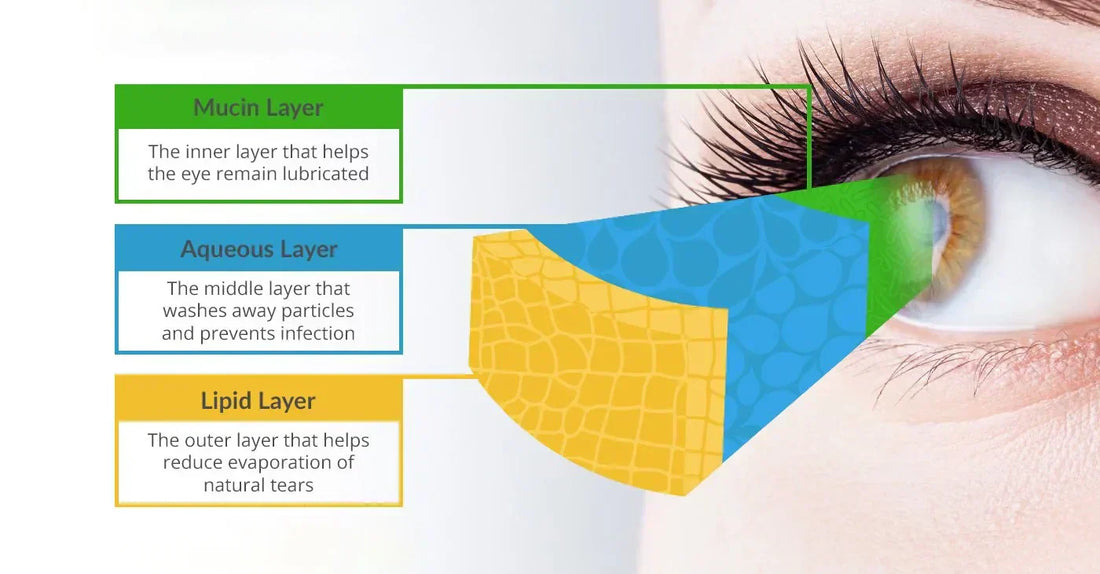Dry Eye Strategies for Natural Dry Eye Sufferers
Natural dry eyes can cause irritation, fatigue, and blurred vision. Learn 5 effective strategies to stay comfortable, including EyeOasis Sleeping Tape, healthy eye habits, lubricating drops, environmental protection, and guidance from an eye care professional.

5 Ways to Manage Natural Dry Eyes and Stay Comfortable
Dry eyes can affect anyone — not just people recovering from surgery or wearing contact lenses. Whether it’s due to aging, hormones, dehydration, or environmental stress, dryness can cause irritation, fatigue, and blurred vision throughout the day. Fortunately, simple and consistent care can help restore comfort and maintain a stable tear film. Here are five effective strategies for managing naturally dry eyes and keeping them healthy long-term.
Quick Navigation
1. Use EyeOasis Sleeping Tape at Night
Nighttime moisture loss is one of the most overlooked contributors to natural dry eyes. During sleep, your tear production decreases by up to 70%, making your eyelids the primary defense against evaporation. Even if your eyes appear fully closed, tiny gaps can allow tears to escape, leaving the surface dry and irritated by morning.
EyeOasis Sleeping Tape gently seals your eyelids overnight, helping retain natural tears and maintain a stable moisture barrier. Unlike sleep masks that can shift or press unevenly, this tape adheres softly and securely — ensuring your eyes stay protected in any sleep position.
- Reduces overnight irritation and burning sensations
- Prevents moisture loss and supports hydration
- Promotes more restful, irritation-free sleep
If you frequently wake up with sandy or sticky eyes, incorporating an eyelid seal into your routine can make a noticeable difference within a few nights.
2. Build Healthy Eye Habits
Your daily habits significantly affect how well your eyes stay lubricated. Extended screen time, poor blinking patterns, and dehydration can all reduce tear quality and stability.
- Blink fully and often: When using screens, blinking can drop by up to 60%. Make conscious efforts to close your eyes fully every few minutes.
- Practice gentle eye massages: Use clean fingers or a warm compress to stimulate oil glands along your eyelids, improving tear film quality.
- Follow the 20-20-20 rule: Every 20 minutes, look 20 feet away for 20 seconds to reduce digital strain and dryness.
These small adjustments protect your tear film throughout the day, reducing fatigue and improving comfort naturally.
3. Use Lubricating Drops or Ointments
Artificial tears are a cornerstone of dry eye management. They help restore the tear film, wash away irritants, and provide relief from discomfort.
- Choose preservative-free drops to avoid chemical irritation, especially for frequent use.
- Apply drops before and after long periods of screen time or reading.
- For nighttime comfort, consider thicker gels or ointments that provide extended hydration.
Consistent lubrication keeps your cornea healthy, supports clearer vision, and complements other dry eye treatments like EyeOasis tape.
4. Protect Your Eyes from Environmental Stressors
Environmental factors are among the biggest contributors to natural dry eyes. Air conditioning, low humidity, and wind all speed up tear evaporation. Proactively managing your environment can significantly improve comfort.
- Use humidifiers indoors: Ideal humidity levels for eye comfort range between 40–60%.
- Wear sunglasses or wraparound eyewear: Shields against wind, sun, and airborne debris.
- Avoid direct airflow: Don’t sleep or sit directly under vents, fans, or heaters.
By optimizing your surroundings, you create a moisture-friendly environment that helps preserve the natural tear film throughout the day and night.
5. Consult an Eye Care Professional When Needed
If your eyes remain persistently dry despite home remedies, it may be time to seek professional guidance. An optometrist or ophthalmologist can help identify underlying conditions and tailor a treatment plan to your needs.
- They can diagnose Meibomian Gland Dysfunction (MGD) or other tear film imbalances.
- They may prescribe anti-inflammatory or tear-stimulating eye drops for severe cases.
- In rare circumstances, they may suggest procedures like punctal plugs to retain tears longer.
Regular checkups are essential for preventing complications and maintaining long-term eye comfort.
Shop the Solution
Protect your eyes from nighttime dryness and wake up refreshed with EyeOasis Sleeping Tape. Its gentle adhesive keeps eyelids softly sealed overnight, preventing evaporation and irritation — a simple, natural solution for anyone struggling with dryness.
Sources
- Craig JP, et al. TFOS DEWS II: Tear Film Homeostasis and Dry Eye Disease. Ocul Surf. 2017.
- Wolkoff P. Indoor Air Humidity and Eye Irritation. Indoor Air. 2018.
- Stapleton F, et al. Management and Therapy of Dry Eye Disease. Ocul Surf. 2017.
- American Academy of Ophthalmology (AAO). Dry Eye Syndrome: Diagnosis and Prevention.
